 April 2015 Tank of the Month
April 2015 Tank of the Month
April 2015 Tank of the Month
Peter Eichler's 156 US-gallon Reef Aquarium
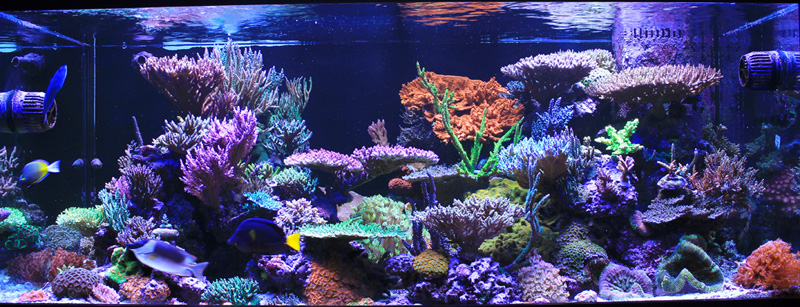 |
Introduction
For many years I have looked at the tank of the month as something to take inspiration from and to aspire to. So I was particularly honored and excited when I was informed my aquarium would be featured as tank of the month for April. The timing was a bit disconcerting, but if you’re reading this now, it’s not just some sick April fool’s joke designed to mess with an aquarium junkie!
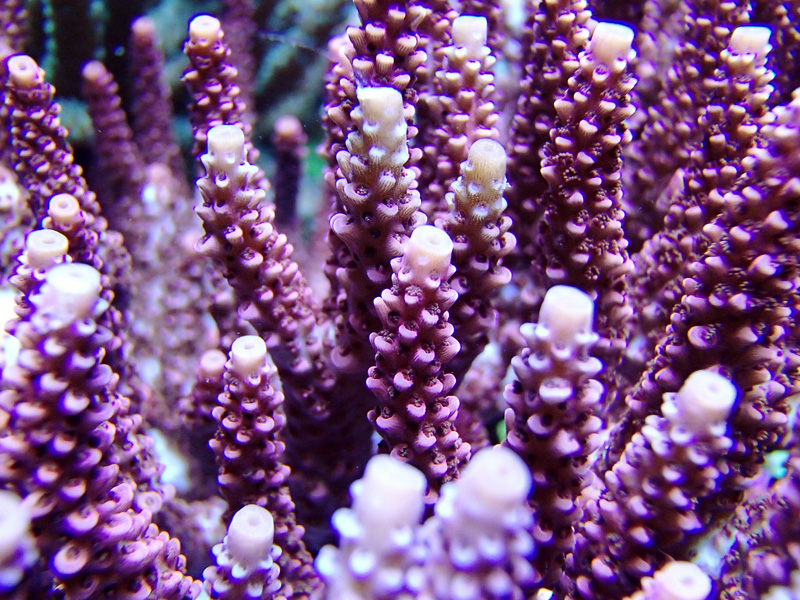 |
My Aquarium Journey
I have had an aquarium in my home for as long as I can remember. My first tank, a stainless steel framed slate bottom 20 gallon aquarium, was set-up prior to my ability to remember. Around the age of 11, my mother and I were shopping for some bird and fish supplies at the local pet shop. That shop had recently added a salt water section, and I was absolutely transfixed by the dazzling colors and amazing variety of fish. I was instantly hooked, and soon talked my mother into helping me buy a new aquarium.
My first saltwater aquarium… 30 gallons of pure joy and anguish all in one! Under gravel filter: check. Non-submersible heater: check. Random bleached and dead coral decorations: check. Condylactus anemones, “live rock” full of sponges, an “Assorted Butterfly” and a powder brown tang for my first non-damselfish: you bet! As you may be guessing, that didn’t end so well. I was heartbroken to fail so miserably, but I was more driven than ever. Driven by my failure, over the next five years I read every aquarium book and publication available, every marine biology text book in existence., I studied fish nutrition and developed my own frozen fish food line, expanded my aquarium collection to over 10 marine aquariums, bred dozens of species of clownfish and Tanganyika and Malawi cichlids, and managed the marine section at the best fish store in the area. Did I mention I was hooked?
In the 25 years or so that have followed, some of that intensity I had for the hobby had to take a backseat to school, girls, partying, getting married, having children, buying a house, and all the things we all do as we grow up and try to become responsible members of society. However, no matter what my situation, I’ve always been a part of this hobby and have done what I can to gain a greater understanding of these wonderful creatures we keep. The tank you’re about to see and read more about is the result of my journey through this hobby.
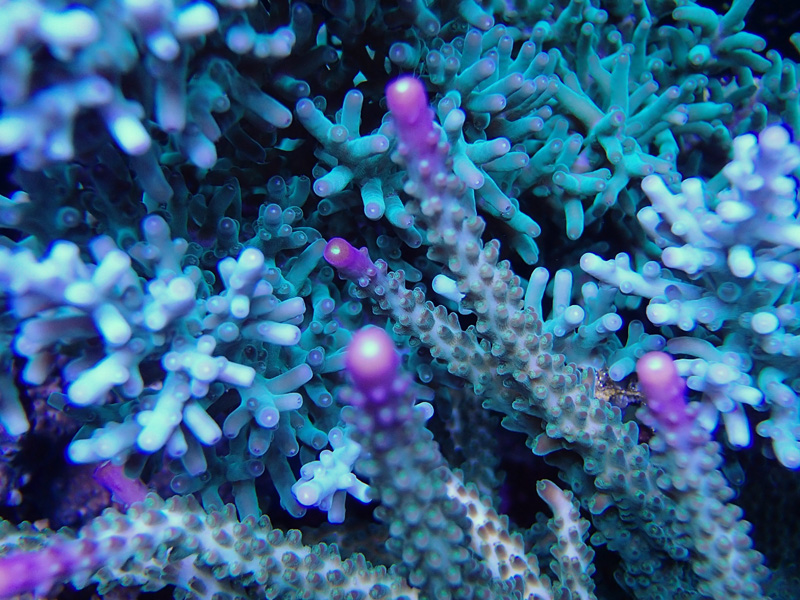 |
System Profile
• Display: 156 gallon (575L) Oceanic with Starphire Glass (60in x 24in x 24in)
• Sump: 100 gallon stock tank
• Frag and Anemone Tank: Deep Blue 45 gallon / 45 Gallon Marineland Cube
• Skimmer: SWC 250A
• Calcium Reactor: GEO 624 with Aquarium Plants Carbon Doser
• Heaters: 300W Visitherms x2
• Lighting: 250W Radiums with LB III Reflectors & Lumatek Variable Watt Ballast
• Filtration: Nothing other than the skimmer & a rarely used media reactor
• Return Pump: Laguna Max-Flo 1500 pump for the display and Cube
• Circulation: Ecotech MP40s x3
• Chemical Filtration: GAC run every month or two for a few days
• Rock: A mix of 10 year old Uaniva live rock, Dry Pukani, & Fiji rock
• Sandbed: One inch deep special grade Aragonite
Current System
My main display sits on a half finished, yet sturdy, homemade stand in my ugly old basement. Three tanks, a 45 gallon frag tank, 45 cube anemone tank, and the 156 gallon display all flow into a central sump. Hopefully my next home will have a much larger tank on display in a living area, but for now the ability to be messy and worry only about the function of the aquarium has it perks.
The display, as the rock sits now, is about three years old. But, this tank was set-up back in 2010 as a transfer from an overgrown 65 gallon reef I started 10 years ago. Many of the current corals have been grown from frags of colonies I grew in that 65. A little over three years ago my tank had gone into some disrepair because I was traveling extensively for work, and thanks to some zoanthids that wanted to take over my tank. I decided to rededicate myself and turn things around by redoing roughly half the rockwork, fragging many dying corals, and doing a couple large water changes.
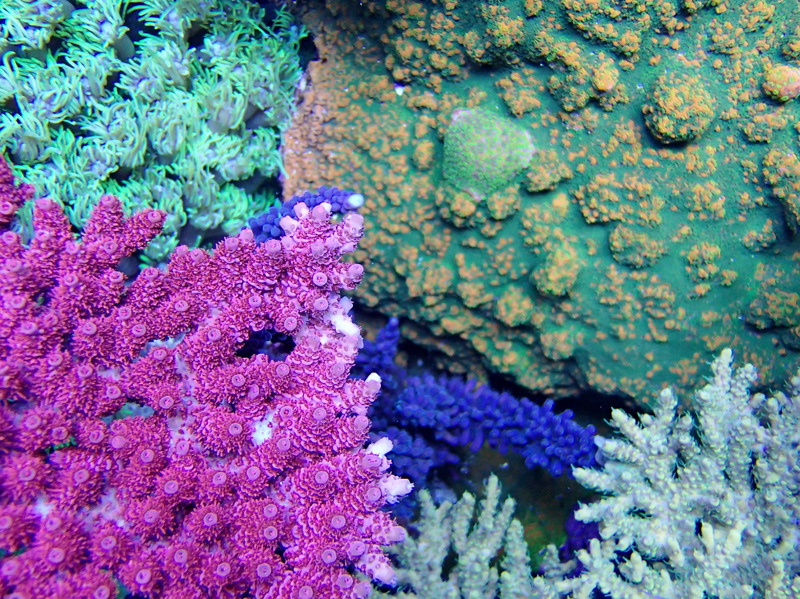 |
Philosophy
A big skimmer, quality light, a lot of flow, and a decent stock level of fish that are fed heavily, are my basic keys to success. When I had my fish food company I learned early on that feeding heavily was in the best interest of my inhabitants. I feel tanks will adapt and adjust over time to extra food coming in. Sometimes grazers are a big help here. With a good and oversized protein skimmer, you can feed heavy and still be successful. Whether or not phosphate will need to be controlled via other means will depend on the system, but don’t let phosphate addition keep you from feeding your inhabitants regularly.
|
Water Parameters:
|
Maintenance
I do water changes when I feel like it, but try to do a 50 gallon change on my roughly 250 gallon system every two to four weeks. I’ll also throw in a 100 gallon change every year or so. I fill the calcium reactor when the media is low, I fill the CO2 when I see the pressure drop on my tank, and I clean the glass when I’m feeling motivated and see it’s dirty. GAC is run for a few days when I notice the water is has a slight yellow tinge when looking through the side glass the length of the tank. RO/DI filters are changed whenever I’ve exhausted two full DI resins.
The biggest maintenance has become figuring out what to clip, prune, move, or even remove as corals grow into large colonies. It’s a good problem to have, but is proving at times far more difficult than maintaining a younger aquarium.
As far as maintaining parameters, there’s a fairly wide acceptable range for me. I purposely encourage the temperature in my tank to fluctuate throughout the day. Less than 75 and I throw another heater in the sump. On the high side I don’t really get concerned in summer until beyond 85, though having the tank in the basement prevents that from being much of a concern. I try to maintain my dKH around 7, but I don’t fret too much if it gets a little higher or lower. 6-8 dKH is my preferred range. Calcium, as long as it’s over 400, I’m happy, and I’ve never seen much difference between 400 and 550. I test alkalinity (API) several times a week, calcium (API) every month or two, magnesium (Salifert) a few times a year, and nitrate (Red Sea) and phosphate (Hanna) when I feel like it.
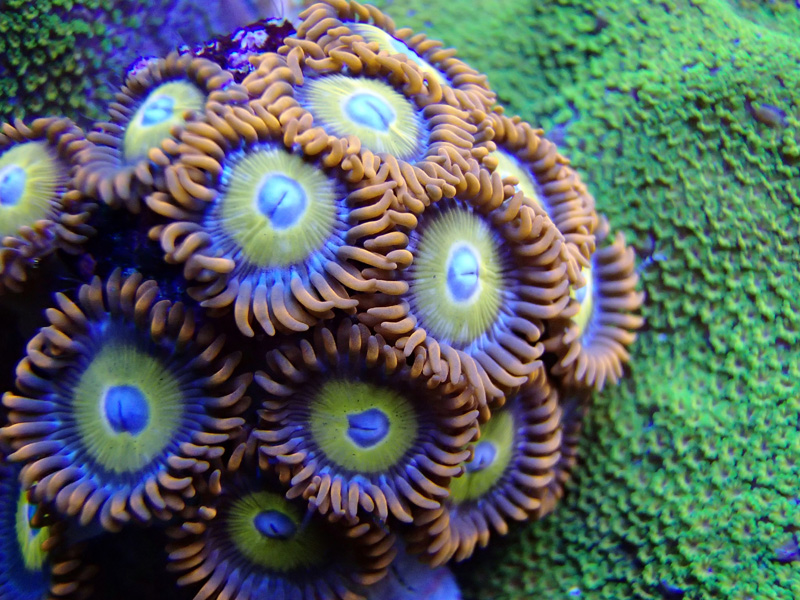 |
Supplements
I’ve dabbled with just about every supplement and form of dosing imaginable. However, for most of the last 10 years I’ve done little else besides maintain calcium, alkalinity, and magnesium.
For the last year and a half I’ve been experimenting with dosing potassium nitrate and sodium nitrate to keep nitrates detectable, so nitrate has been tested more frequently of late. I no longer have to use GFO to keep phosphates low. As a result I have to feed heavier and be cautious about skipping feedings or else corals will lighten in color and show signs of stress. I can’t attribute this shift in naturally low phosphates to much else other than the Redfield ratio and my dosing of a nitrate source, but that’s based on speculation and anecdotal evidence. I could probably solve the issues with my phosphates and nitrates being too low by downsizing my skimmer, but finding that perfect size is a difficult task.
One thing I am very confident of from all my years of “experimenting”… When It comes to supplements, simply maintaining the big three elements is all that’s needed to have a great aquarium.
Stability and Breaking from the Norms
Stability is something I feel is often hyped too much within the hobby. I have encouraged fluctuations in temperature for many years on my tanks. I won’t hesitate to boost my magnesium by a few hundred PPM or calcium by 100 ppm in one shot if they’re getting low. If my alkalinity jumps by 1-2 dKH from a water change I’m not worried. Though I would prefer to keep these stable, I don’t see much detriment to small dips and spikes. I have seen issues from dKH rising above 9 dKH in my lower nutrient tank, so I do whatever I can to avoid this. Stability certainly isn’t a bad thing to shoot for, but I feel stability within a range should be the focus. Having stable parameters that are outside desirable ranges is where the problem really lies, not with small fluctuations.
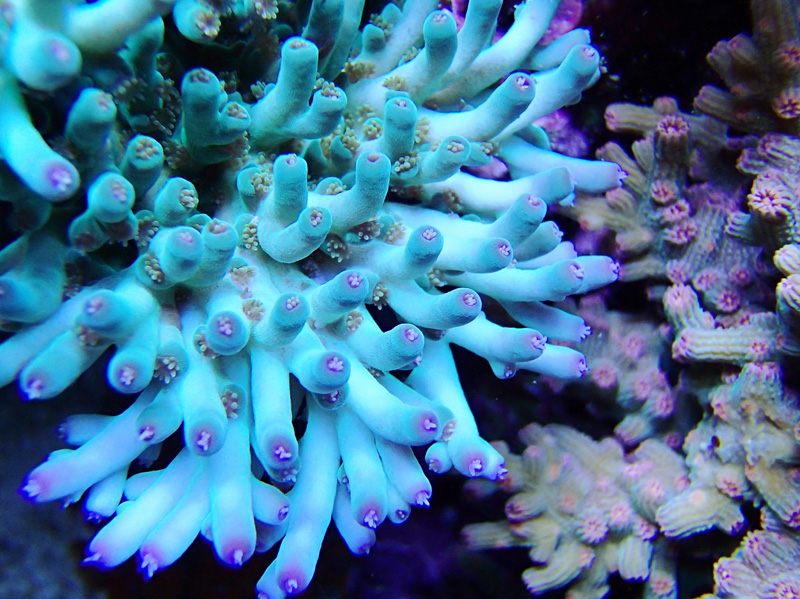 |
Livestock Inhabitants
Coral:
Nearly all corals grown from small frags. All Goniopora have been in the system for at least two years and have shown considerable growth.
Acropora
RR Red Bull
RR CJ’s Pinky
RR Sabertooth
RR Wolverine
RR Prometheus
RR The Vinh
RR Purple Dragon Eyes
SC Orange Passion
Greg Hiller’s Aqua Delight
Original SSC Sapphire millepora
Purple Slimer
Tyree Lime in the Sky
Tyree Mr. Pacman
Tyree Pink Lemonade
Tyree Phonape Birdsnest
Tyree Soli
Bananas Suharsoni
SunnyX Sunset mille
Ultimate’s Rainbow
CITR Red Dragon
CC Blue Valkyrie
CC Red Oxide
CC Grape Lemonade
ORA Hawkin’s
ORA Red Planet
ORA Joe the Coral
ORA Scripps mille
ORA Ice Tort
Oregon Tort
Royal Blue Tort
Miyagi Tort
PC Rainbow
Garf Bonsai
Rommel’s Watermelon
Copp’s Azure Stag
Copp’s Hulk mille
DFS Pink Panther
Aquascenes Icefire echinata
Green Turaki
Original SSC
$500 Efflo
Upscales microclados
Highlighter stag
Rouge mille
Bubblegum mille
Sapphire mille
Mr. Pacman
Several no names and some I’m forgetting
Montipora and Porites
Setosa
Rainbow
Sunset
Season’s Greetings
Idaho Grape
Starburst Cap
Sand dollar
Eruzione
Favia
Mia’s Pot of Gold
Christmas
Raptor’s Peace
Goniopora
Goniopora stutchburyi
Goniopora burgosi
Goniopora palmensis
Goniopora planulata
4 x unknown species
Zoanthids
Fruitloops
Spidermans
Utter Chaos
Rastas
Vivid Rainbows
Purple hornets
Red hornets
Goochsters
Bambams
Pink elephants
Sopranos
VDM
Challices
Crazy Fox
OG Mummy Eye
Miami Hurricane
Red
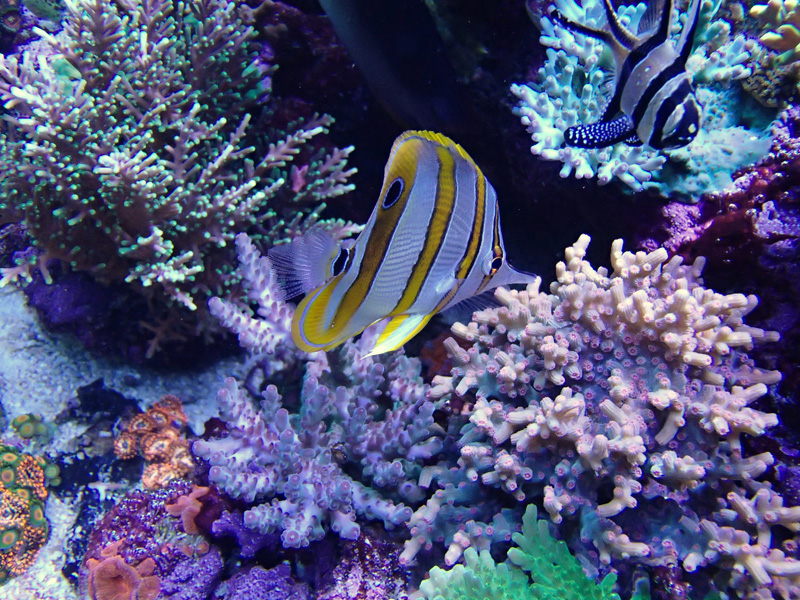 |
Fish:
Some of these are in my frag tank and anemone tank, I buy small Zebrasoma and Ctenochaetus tangs and always have at least a couple in my frag tank, I will sell them or trade them as they start to get too big for that tank.
Purple Tang (Zebrasoma xanthurum)
Powder Brown Tang (Acanthurus japonicas)
Chevron Tang (Ctenochaetus hawaiiensis)
Tomini Tang (Ctenochaetus tomini)
Yellow Tang (Zebrasoma flavescens)
Magnificent Foxface (Siganis magnificus)
Pseudochomis Fridmani
Pseudochromis spingeri
Pseudochromis aldabraensis x Pseudochromis springeri
Bangaii Cardinal (Pterapogon kauderni)
Copperband Butterfly (Chelmon rostratus)
Melanurus Wrasse (Halichoeres melanurus)
Marine Betta (Calloplesiops altivelis)
Golden Damsel (Amblyglyphidodon aureus) x2
Whitetail Dottyback (Manonichthys cf. alleni)
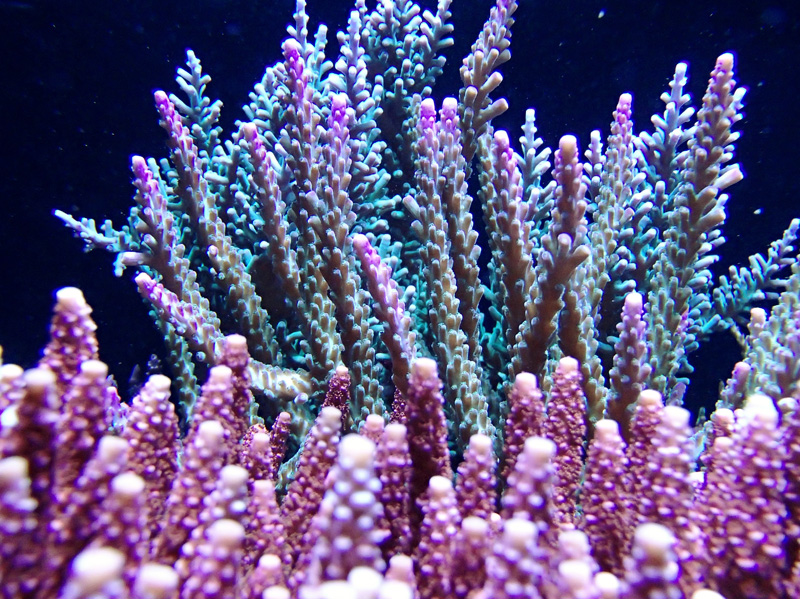 |
Acknowledgements
First and foremost I would like to thank my mother. She loved this hobby as much as I do, and was always supportive and full of love and encouragement. This held true not just for me, but for anyone that was lucky enough to meet her.
Thanks to all the reefers who take the time to share their thoughts and opinions in order to help others succeed. Thanks to the forums out there, (RC, Wisconsin Reef Society) that give people a place to learn and share ideas. Thanks to Brian, Judy, Kevin, Laura, Tyler and Mark at Best Fish for being a part of one of the best local fish stores in the country.
Thanks to my wife and past roommates who have allowed me to do my thing without complaint; even with condensation on windows, puddles on the floors, and a salty crust forming on just about everything near the tank.
Lastly, big thanks to the gang from the SPS forum and for all the kinds words and simply being a good and helpful group of reefers, an especially large thanks to Sahin and those reefers that took the time to nominate my tank! It’s always a great feeling when peers recognize the hard work that is put into something. Thanks for reading!
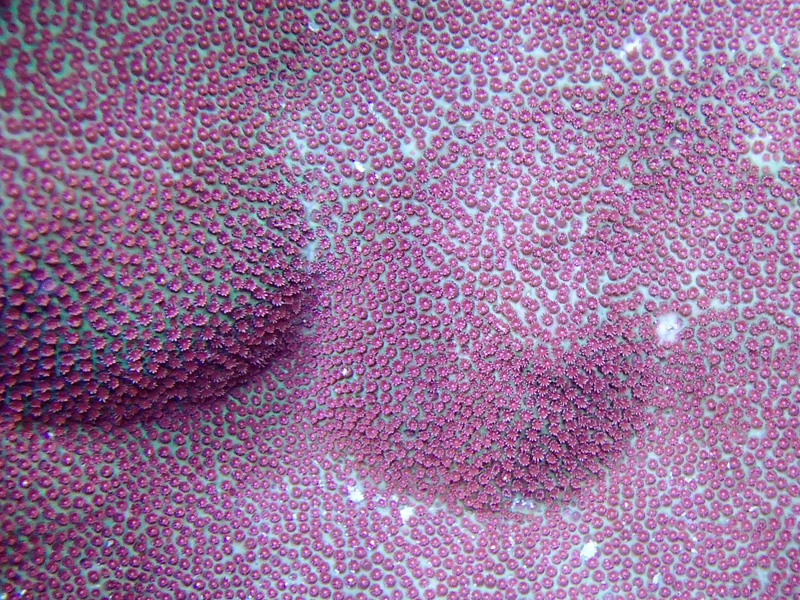 |
Feel free to comment or ask questions about my tank in the Tank of the Month thread on Reef Central.



